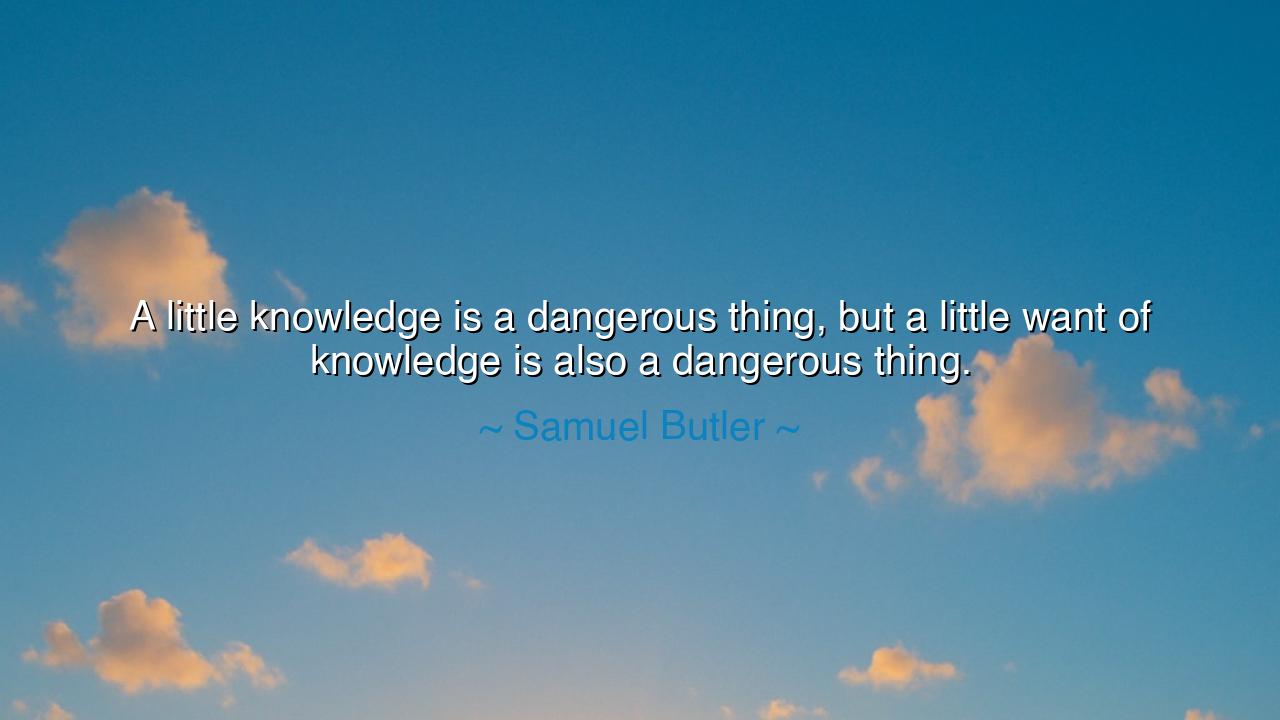
A little knowledge is a dangerous thing, but a little want of
A little knowledge is a dangerous thing, but a little want of knowledge is also a dangerous thing.






The English novelist and satirist Samuel Butler once wrote: “A little knowledge is a dangerous thing, but a little want of knowledge is also a dangerous thing.” In this single paradox, he captured the eternal struggle of the human mind—to know, yet to know humbly. It is a mirror of the human condition, where ignorance and arrogance stand as twin perils on either side of wisdom. Knowledge, when partial, may make a man bold beyond reason; but ignorance, when chosen or accepted, may make him blind beyond repair. Between these two dangers lies the narrow path of discernment—the way of those who learn not for pride, but for understanding.
To understand the origin of this thought, one must remember the man who spoke it. Samuel Butler, born in the nineteenth century, was a writer of sharp wit and deep contemplation. His works often questioned tradition, faith, and human self-deception. Living in the shadow of scientific revolutions and moral upheavals, he witnessed how men armed with fragments of knowledge often wielded them like weapons—half-learned ideas turned into dogma, partial truths mistaken for certainty. Yet he also saw the folly of those who fled knowledge altogether, clinging to ignorance as comfort. His words were not condemnation, but a warning—a plea for balance, for humility before truth.
When Butler says, “A little knowledge is a dangerous thing,” he echoes an older proverb made famous by Alexander Pope. A person who grasps only fragments of understanding, yet believes himself wise, becomes reckless. He walks into complexity with confidence, unaware of the depths he cannot see. This is the scholar who knows theory but not practice; the leader who commands without comprehension; the zealot who believes without reflection. History is full of such figures—men whose limited knowledge birthed ruin. The physician of medieval times who clung to bloodletting, believing it to cure all illness; the engineer who dismissed safety in pursuit of speed; the politician who reforms without understanding the soul of his people. In each, knowledge half-formed became more dangerous than ignorance itself.
But Butler, with deeper wisdom, adds the second half—“a little want of knowledge is also a dangerous thing.” This turns the mirror upon the opposite fault: the refusal to learn, the willful closing of the mind. Ignorance is no less perilous than arrogance. The man who avoids knowledge becomes a leaf in the wind, driven by rumor, passion, and fear. He cannot see the path ahead, nor the consequences of his choices. In our own age, this danger is everywhere: the citizen who rejects science, the follower who never questions authority, the crowd that moves with noise but not with thought. If partial knowledge blinds one eye, ignorance blinds both. The one stumbles forward; the other never moves at all.
Consider the story of Galileo Galilei, whose life embodies the tension between these two dangers. In his time, the Church clung to old cosmologies—not from malice, but from want of knowledge, from fear of what new truth might mean. Yet others, newly acquainted with science, grew proud of partial knowledge, thinking reason alone could replace all faith. Galileo, standing between these extremes, sought harmony. He believed that knowledge, when pursued with reverence, reveals divine order. For this, he was silenced. But centuries later, the world recognized that his balance—the humility to seek truth without arrogance, and the courage to confront ignorance—was the true mark of wisdom.
In this light, Butler’s words are not cynical but profoundly moral. He reminds us that both arrogance and apathy betray the sacred duty of the mind. The goal of learning is not mastery over others, but mastery over oneself. True wisdom comes not from having much knowledge, but from knowing how little we truly grasp. The wise are never finished learning; the foolish, whether proud or indifferent, believe themselves complete. As the ancient philosophers taught, the beginning of wisdom is the admission of ignorance, and the continuation of wisdom is the pursuit of understanding.
What then is the lesson for us, the inheritors of this age of information? It is this: Seek knowledge, but seek it with humility. Question, but also listen. Study not to boast, but to serve. When you learn, remember that every truth opens a thousand mysteries. When you do not know, have the courage to ask. Let neither pride in half-knowledge nor comfort in ignorance govern your spirit. Instead, let your pursuit of truth be like the steady light of dawn—gentle, growing, illuminating all things in time.
Thus, in the echo of Samuel Butler’s paradox, we find a complete philosophy of learning. Knowledge without humility breeds destruction; ignorance without curiosity breeds decay. The wise heart walks between them, learning always, doubting wisely, and living as a student of the infinite. For in the end, the danger is not in knowing or not knowing—it is in ceasing to seek. And so, let every soul remember: the mind that learns humbly shall never be lost in the dark.






AAdministratorAdministrator
Welcome, honored guests. Please leave a comment, we will respond soon